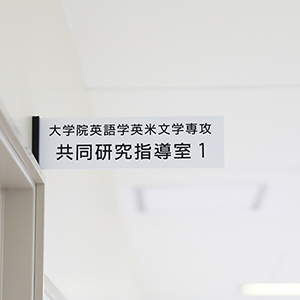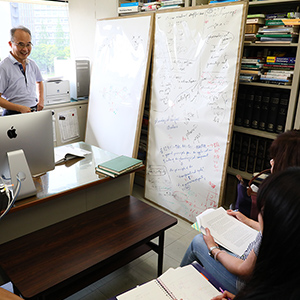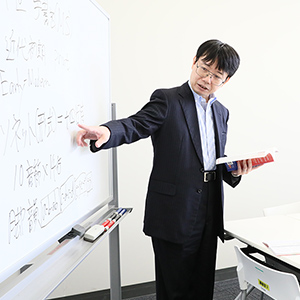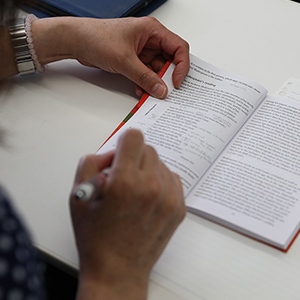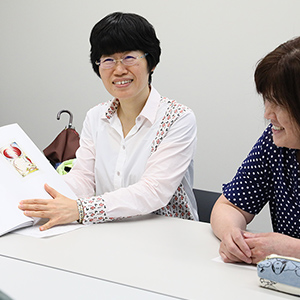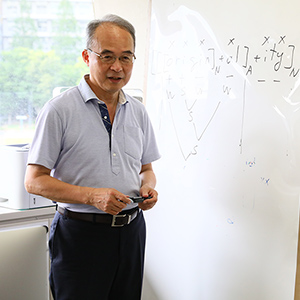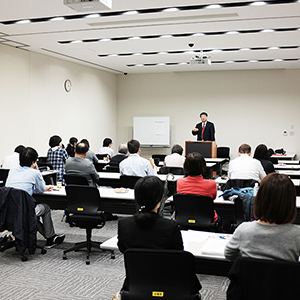English Language and Literature
This program offers lectures, seminars, and special studies in the fields of syntax theory, phonology, semantics, historical linguistics, Anglo-American theater, Anglo-American novels, Anglo-American poetry, and English language education. Classes are run by professional researchers including teachers from England and America. Research activities are also thriving in this program. Graduate students receive detailed guidance from their professors in both the first and second half of the program, deepen their knowledge of specialized fields, and work hard every day with the goal of writing a thesis.
Curriculum
Master's Program
Please click on the tab of the field you want to view.
- English Language
- English Literature
- American Literature
- English Language Education
| Subjects | Number of Credits |
|---|---|
| Specialized Lecture in English Language I a | 2 credits |
| Specialized Lecture in English Language I b | 2 credits |
| Graduate Seminar in English Language I | 4 or 8 credits |
| Specialized Lecture in English Language II a | 2 credits |
| Specialized Lecture in English Language II b | 2 credits |
| Graduate Seminar in English Language II | 4 or 8 credits |
| Specialized Lecture in English Language III a | 2 credits |
| Specialized Lecture in English Language III b | 2 credits |
| Graduate Seminar in English Language III | 4 or 8 credits |
| Specialized Lecture in English Language IV a | 2 credits |
| Specialized Lecture in English Language IV b | 2 credits |
| Graduate Seminar in English Language IV | 4 or 8 credits |
| Specialized Lecture in English Language V a | 2 credits |
| Specialized Lecture in English Language Ⅴ b | 2 credits |
| Graduate Seminar in English Language Ⅴ | 4 or 8 credits |
| Intensive Course in English Language I | 2 credits |
| Intensive Course in English Language II | 2 credits |
| Subjects | Number of Credits |
|---|---|
| Specialized Lecture in English Literature I a | 2 credits |
| Specialized Lecture in English Literature I b | 2 credits |
| Graduate Seminar in English Literature I | 4 or 8 credits |
| Specialized Lecture in English Literature II a | 2 credits |
| Specialized Lecture in English Literature II b | 2 credits |
| Graduate Seminar in English Literature II | 4 or 8 credits |
| Specialized Lecture in English Literature III a | 2 credits |
| Specialized Lecture in English Literature III b | 2 credits |
| Graduate Seminar in English Literature III | 4 or 8 credits |
| Specialized Lecture in English Literature IⅤ a | 2 credits |
| Specialized Lecture in English Literature IV b | 2 credits |
| Graduate Seminar in English Literature IV | 4 or 8 credits |
| Specialized Lecture in English Literature Ⅴ a | 2 credits |
| Specialized Lecture in English Literature Ⅴ b | 2 credits |
| Graduate Seminar in English Literature Ⅴ | 4 or 8 credits |
| Intensive Course in English Literature I | 2 credits |
| Intensive Course in English Literature I | 2 credits |
| Subjects | Number of Credits |
|---|---|
| Specialized Lecture in American Literature I a | 2 credits |
| Specialized Lecture in American Literature I b | 2 credits |
| Graduate Seminar in American Literature I | 4 or 8 credits |
| Specialized Lecture in American Literature II a | 2 credits |
| Specialized Lecture in American Literature II b | 2 credits |
| Graduate Seminar in American Literature II | 4 or 8 credits |
| Specialized Lecture in American Literature III a | 2 credits |
| Specialized Lecture in American Literature III b | 2 credits |
| Graduate Seminar in American Literature III | 4 or 8 credits |
| Intensive Course in American Literature I | 2 credits |
| Intensive Course in American Literature II | 2 credits |
| Subjects | Number of Credits |
|---|---|
| Specialized Lecture in English Language Education I a | 2 credits |
| Specialized Lecture in English Language Education I b | 2 credits |
| Graduate Seminar in English Language Education I | 4 or 8 credits |
| Specialized Lecture in English Language Education II a | 2 credits |
| Specialized Lecture in English Language Education II b | 2 credits |
| Graduate Seminar in English Language Education II | 4 or 8 credits |
Doctoral Program
Please click on the tab of the field you want to view.
- English Language
- English Literature
- American Literature
| Tutorial Academic Subjects | Number of Credits |
|---|---|
| Special Studies in English Language I | 4 or 12 credits |
| Special Studies in English Language II | 4 or 12 credits |
| Special Studies in English LanguageⅢ | 4 or 12 credits |
| Special Lecture in English Language I | 4 credits |
| Special Lecture in English Language II | 4 credits |
| Special Lecture in English Language III | 4 credits |
| Tutorial Academic Subjects | Number of Credits |
|---|---|
| Special Studies in English Literature I | 4 or 12 credits |
| Special Studies in English Literature II | 4 or 12 credits |
| Special Studies in English Literature III | 4 or 12 credits |
| Special Studies in English Literature IV | 4 or 12 credits |
| Special Lecture in English Literature I | 4 credits |
| Special Lecture in English Literature II | 4 credits |
| Special Lecture in English Literature III | 4 credits |
| Special Lecture in English Literature IV | 4 credits |
| Special Lecture in English Literature Ⅴ | 4 credits |
| Tutorial Academic Subjects | Number of Credits |
|---|---|
| Special Studies in American Literature I | 4 or 12 credits |
| Special Studies in American Literature II | 4 or 12 credits |
| Special Lecture in American Literature I | 4 credits |
| Special Lecture in American Literature II | 4 credits |
Process of Acquiring a Master’s Degree or PhD
Master's Program
Requirements for Applying for a Master’s Degree
- Period of Enrollment
You must be enrolled in the master's program for more than 2 years. - Credit Requirements
A total of 32 credits or more must be obtained for a predetermined subject.
Process to Apply for a Degree
-
Framework of Research Guidance
Students will receive guidance on setting a research theme and creating a research plan in their field of specialization from a supervisor determined at the time of enrollment. Graduate students will conduct a series of research activities, and acquire professional competence through presentations of research results at research debriefings and conferences. -
First year
April: Attend orientation sessions, narrow down research topics and develop research plan.
November: Presentation of master's thesis concept at Theme & Method (master's thesis preparation plan presentation).
December: Submit the Theme & Method manuscript to the Journal of English Language and Literature. -
Second year
October: Submit the master's thesis title.
October: Receive approval from the vice-chief supervisor at the regular committee meeting.
January: Submit the master's thesis.
February: Take the final examination (oral examination) of master's thesis by the chief and vice-chief examiners.
March: Present the results of the research at the master's thesis presentation.
Doctoral Program
Requirements for Applying for a PhD
- Period of Enrollment
Those who have been enrolled in the doctoral program for more than 3 years, have earned the required credits, and have received the necessary research guidance.
Process to Apply for a Degree
-
Framework of Research Guidance
Students will receive guidance on research activities in their field of specialization from a supervisor determined at the time of enrollment. Graduate students will conduct a series of research activities, report the results at academic conferences, submit papers to specialized journals, and experience rigorous peer review, thereby acquiring the ability to carry out research activities independently. -
First year
First semester: Review of master's thesis (general review and revision).
Second semester: Based on the review of the first semester, organize, restructure and reinforce the arguments of the master's thesis. -
Second year
First semester: Begin writing the doctoral thesis in earnest, building on the work of the first year.
Second semester: Continue work from the previous semester. The doctoral thesis will be presented at the Kyushu Branch of The English Linguistic Society of Japan (or an equivalent convention) in October as an interim review of the thesis. -
Third year
First semester: Submit and publish the essence of the doctoral thesis in the "Journal of the Graduate School of Fukuoka University".
Second semester: Complete the doctoral thesis. A public hearing will be held.
See other majors
- History Master's Program and Doctoral Program
- Japanese Language and Literature Master's Program and Doctoral Program
- German Language and Literature Master's Program and Doctoral Program
- French Language and Literature Master's Program and Doctoral Program
- Socio-Cultural Studies Master’s Program
- Education and Clinical Psychology Master's Program and Doctoral Program

